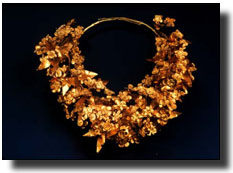![[ Macedonia by Nicolas Martis]](../images/macedonia.gif)
![[ Macedonia by Nicolas Martis]](../images/macedonia.gif)
The Greek identity of the Ancient Macedonians and their name is attested, among other sources, by:
"And she conceived and bore to Zeus who delights in the thunderbolttwo sons, Magnes and Macedon, rejoicing in horses, who dwell round-aboutPieria and Olympus", Hesiod, Catalogues of Women and Eoiae 3 (Loeb, H.G. Evelyn-White).
"Macedonia, of course, is a part of Greece". Strabo, VII, Frg. 9 (Loeb, H.L. Jones)
"The Peloponnesians that were with the fleet were... the Lacedaemonians ... the Corinthians... the Sicyonians... the Epidaurians... the Troezenians... the people of Hermione there; all these, except the people of Hermione, were of Dorian and Macedonian stock and had last come from Erineus and Pindus and the Dryopian region". Herodotus VIII, 43 (Loeb. A.D. Godley)."For in the days of king Deucalion it inhabited the land of Phthiotis, then in the time of Dorus son of Helen the country called Histiaean, under Ossa and Olympus; driven by the Cadmeans from this Histiaean country it settled about Pindus in the parts called Macedonian; thence again it migrated to Dryopia, and at last came from Dryopia into Peloponnesus, where it took the name of Dorian". Herodotus I, 56, 3 (Loeb, A.D. Godley).
"Tell your king who sent you how his Greek viceroy of Macedonia has received you hospitably... " Herodotus V, 20, 4 (Loeb, A.D. Godley)
"For I myself am by ancient descent a Greek, and I would not willingly see Hellas change her freedom for slavery". Herodotus IX, 45, 2 (Loeb, A.D. Godley)
"Now that these descendants of Perdiccas are Greeks, as they themselves say, I myself chance to know" Herodotus V, 22, 1 (Loeb, A.D. Godley)
"This is a sworn treaty made between us, Hannibal.. and Xenophanes the Athenian... in the presence of all the gods who possess Macedonia and the rest of Greece". The Histories of Polybius, VII, 9, 4 (Loeb, W. R. Paton)"How highly should we honour the Macedonians,
who for the greater part of their lives never cease from fighting with the barbarians for the sake of the security of Greece? For who is not aware that Greece would have constantly stood in the greater danger, had we not been fenced by the Macedonians and the honorable ambition of their kings?" The Histories of Polybius, IX, 35, 2 (Loeb, W.R. Paton)
"... all men will be grateful to you: the Hellenes for your kindness to them and the rest of the nations, if by your hands they are delivered from barbaric despotism and are brought under the protection of Hellas". Isocrates, To Philip, 154 (Loeb, G. Norlin)"It is your privilege, as one who has been blessed with untrammeled freedom, to consider all Hellas your fatherland, as did the founder of your race". Isocrates, To Philip, 127 (Loeb, G. Norlin)
"Argos is the land of your fathers". Isocrates, To Philip, XII, 32 (Loeb, G. Norlin),
"Aetolians, Acarnanians, Macedonians, men of the same language" T. Livius XXXI, 29, 15 (Loeb, E.T. Sage) ,
"Three brothers of the lineage of Temenus came as banished men from Argos to Illyria, Gauanes and Aeropos and Perdiccas". Herodotus VIII, 137, l (Loeb, A.P. Godley)"The country by the sea which is now called Macedonia... Alexander, the father of Perdiccas, and his forefathers, who were originally Temenidae from Argos" Thucydides 99,3 (Loeb, C F Smith)
"He sent to Athens three hundred Persian panoplies tobe set up to Athena in the acropolis; he ordered this inscription to be attached: Alexander son of Philip and the Greeks, except the Lacedaemonians, set up these spoils from the barbarians dwelling in Asia", Arrian I, 16, 7 (Loeb, P. A. Brunt)
"Your ancestors invaded Macedonia and the rest of Greece and did us great harm, though we had done them no prior injury;... I have been appointed hegemon of the Greeks... "Arrian, Anabasis of Alexander II, 14, 4 (Loeb, P. A. Brunt);
"They say that these were the clans collected by Amphiktyon himself in the Greek assembly... `The Macedonians managed to join and the entire Phocian race... In my day there were thirty members: six each from Nikopolis, Macedonia, and Thessaly...". Pausanias, Phokis VIII 2&4 (Loeb, W. Jones)"But Alexander proving himself to be an Argive, he was judged to be a Greek; so he contended in the furlong race and ran a dead heat for the first place". Herodotus V, 22, 2 (Loeb, A. D. Godley)
"Belistiche, a woman from the coast of Macedonia, won with the pair of foals.. at the hundred and twenty-ninth Olympics". Pausanias, Eleia VIII, 11 (Loeb, W. Jones - H. A. Ormerod);
 Vergina, Philippi, and Thassos). It is a well-known fact
that only the ancient Greeks had theaters. The theater of
Dion hosted the first performance (before an
audience of Greek-speaking Macedonians, of
course) of Euripides world-famous tragedy
Bacchae, which he wrote at Pella of Macedonia.
Euripides died and was buried in Macedonia
Vergina, Philippi, and Thassos). It is a well-known fact
that only the ancient Greeks had theaters. The theater of
Dion hosted the first performance (before an
audience of Greek-speaking Macedonians, of
course) of Euripides world-famous tragedy
Bacchae, which he wrote at Pella of Macedonia.
Euripides died and was buried in Macedonia
"Euripides himself went t' King Aschelausaus and lies buried in Macedonia" Pausanias, Attica II, 2 (Loeb, W. Jones);
![[ Back ]](../images/back.gif)
|
![[ Next ]](../images/next.gif)
|
![[ Imagemap ]](../images/buttons1.gif)